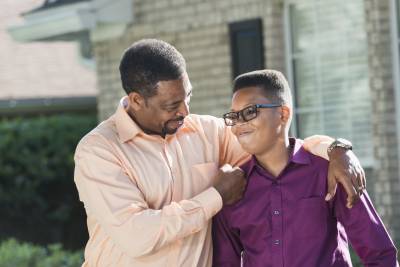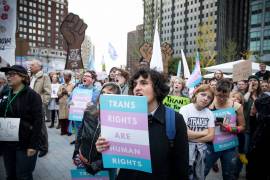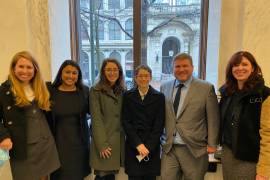
Religious Exemptions in Child Welfare System Would Harm Millions of Children
Blog Search
Today the Movement Advancement Project (MAP) released The High Stakes in the Fulton Case: Undermining the Vital Role of Child Welfare Laws & Regulations in Protecting America’s Children. This report highlights what is at stake in Fulton v. City of Philadelphia, a case the U.S. Supreme Court will hear this fall related to taxpayer-funded child welfare agencies. The report is released in partnership with Lambda Legal, Children’s Rights, Family Equality, National Center on Adoption and Permanency, the North American Council on Adoptable Children, and Voice for Adoption.
This case could harm children and families in the system and jeopardize the ability of governments to enforce nondiscrimination protections more broadly. This report illustrates how if the Court rules that Catholic Social Services (CSS) can refuse to comply with the City of Philadelphia’s nondiscrimination requirement and reject qualified parents simply because of who they are or what religion they are, it is children who will ultimately pay the price.
"Child welfare agencies should always put the safety and wellbeing of children first,” said Ineke Mushovic, Executive Director of MAP. “But if taxpayer-funded child welfare agencies can pick and choose parents and families based on the agency’s religious beliefs—rather than whether or not children are placed in qualified, loving homes—it puts children at risk. And it’s not just child welfare agencies: how the Supreme Court rules could provide a license to discriminate in other areas including homeless shelters, food banks, early childhood education, and more."
The report examines the potential outcomes of the Fulton v. City of Philadelphia case, which could create a license to discriminate throughout the child welfare system, and shows how a broad ruling from the Court in support of CSS could result in:
- Religious child welfare agencies being given a right to demand taxpayer funding while rejecting qualified and loving parents simply because they are Jewish, Catholic, LGBTQ, or single parents. This means that child welfare agencies could keep a child in a government group home rather than place them with loving, qualified parents. In fact, this has already happened: the largest taxpayer-funded foster care agency in South Carolina will only accept evangelical Christian families and has turned away Catholic and Jewish families. When entire groups of otherwise qualified families are shut out of the child welfare system, it means fewer adoptive families and fewer placements for children.
- Nearly every religiously affiliated social service agency that receives government funding—such as job training programs, food assistance, emergency shelters, disaster relief agencies, and more—claiming a right to discriminate. And the ruling wouldn't just allow agencies to discriminate against LGBTQ people; it could also be used to deny essential government services to people of minority faiths, unmarried couples, and others. For example, a taxpayer-funded homeless shelter could deny beds to people who are LGBTQ, Jewish, Muslim or Mormon.
- If the government is unable to set and enforce the terms of its contracts, even when paying agencies with taxpayer money, making it nearly impossible for state and local governments to set standards for the provision of public services.
- Religious agencies being able to claim a religious exemption to a wide array of regulations and laws, including those that protect public health and safety—like building codes, sanitation requirements and food safety regulations. For example, a church-affiliated day care center could claim it is not subject to state laws governing health, safety or licensing of such facilities.
“CSS’s request to discriminate against same-sex couples seeking to foster threatens harm to LGBTQ youth in care — stigmatic harm from a government-endorsed message that they are not equal under the law, and harm due to lack of family home placements likely to meet their needs. And, if the court grants a broad religious exemption to government contract agencies, egregious harm if LGBTQ youth are refused life-saving services, denied supportive placements, or forced to undergo efforts to ‘change’ their identity. Given that LGBTQ youth are disproportionately represented in foster care compared to their non-LGBTQ peers, largely fueled by rejection by their families, and that they too often face discrimination in society at large, governments have a compelling interest and legal obligation to not cause further harm by permitting discrimination of any kind,” said M. Currey Cook, Counsel and Youth in Out-of-Home Care Project Director at Lambda Legal.
“Children’s Rights respects and values the role that faith-based agencies play in providing both placement and services for children in foster care across the country. Our concern is with government-sanctioned discrimination of any kind. The lower courts correctly held that the City of Philadelphia’s anti-discrimination regulation applies to all taxpayer-funded child welfare agencies to ensure that the pool of foster parents and resource caregivers is as diverse and broad as the foster children they serve. I urge the Supreme Court to put children first and uphold Philadelphia’s non-discrimination policy. The only litmus test for these caregivers should be love and safety,” said Christina Wilson Remlin, Lead Counsel at Children’s Rights.
“The stakes in the Fulton case could not be higher for children and families who are involved in the child welfare system,” said Denise Brogan-Kator, chief policy officer at Family Equality. “If the Supreme Court rules that taxpayer-funded foster care agencies have a constitutional right to exclude qualified families based on their religious standards, the impact will be felt on the children in the system who lose placements in loving homes."
"I hope everyone who cares about children reads this report to grasp the grave situation we are in. The Supreme Court's decision, if goes against the city of Philadelphia, could have a far-reaching negative impact on children in foster care and adoption by limiting the pool of families who are able to care for them. We must hope that the court chooses to support nondiscrimination and children's best interests,” said Mary Boo, Executive Director at North American Council on Adoptable Children.
"Our country's foster care system has been in a state of crisis for a while now. Simply put, we have more children in the system than we have families to care for them. Now, in these unprecedented times, we have the added strain on child welfare that a pandemic brings. We need every family that is viable, regardless of marital status, religion, sexual orientation, or gender. Faith has long been part of foster care and adoption, and we hope they always will be. However, faith-based agencies that are receiving public funding and tax dollars have always had the duty to serve everyone, even those that don't hold the same faith and values. Discrimination doesn't have a place in child welfare, especially in foster care or during adoptions. Turning away viable families based on faith-based discrimination is not the right thing to do. Love is love, and our children need a lot of love and a place to call home,” said Schylar Baber, Executive Director at Voice for Adoption.
Read the full report online: The High Stakes in the Fulton Case: Undermining the Vital Role of Child Welfare Laws & Regulations in Protecting America’s Children




